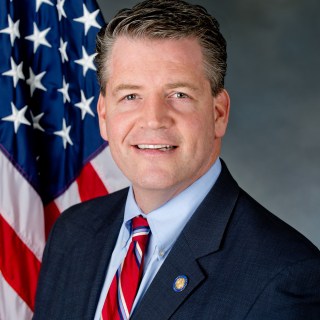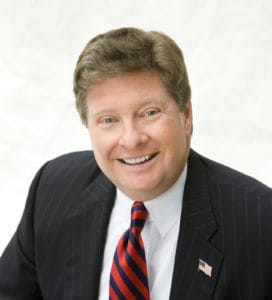

By Dan Murphy
One of the races to watch in Westchester this fall will be the State Senate election in the 40th District, which includes northern Westchester and parts of Putnam and Dutchess counties.
The Senate seat is currently held by Republican Terrence Murphy from Yorktown. Murphy, who kicked off his re-election campaign last week, is completing his second two-year term.
“I have earned a reputation as a bridge-builder,” he told a crowd of nearly 200 in Peekskill’s Dramatic Hall. “I pride myself on finding common ground to work with anybody – regardless of party – to keep things moving and to get the job done.”
Murphy cited his leadership in fighting the heroin and opioid epidemic as proof of his ability to build consensus on critical issues. He authored and passed a law that is now being looked at as a national model that restricted prescription opioids from 30 days down to seven. “It was common sense,” he said. “I worked across the aisle with anyone who was willing to help, and we got the job done.”
His dedication to veterans’ issues, holding utility companies accountable, and advocating for the communities impacted by the closure of Indian Point have been heralded time and again. In this year’s state budget, Murphy secured $24 million to help quell the imminent tax impact because of the plant’s impending closure.
A New York Post story this week referred to a “firestorm” that Murphy has set off by proposing legislation that would require New York voters to show identification at polling locations on Election Day. “The Voter ID law will never pass the Democratic majority Assembly and will never be signed by Gov. Andrew Cuomo,” said one Westchester Democrat. “Maybe in South Carolina, but not here.”
So the question becomes: Why did Murphy propose a law that will never get passed? “Our right to vote is among our most sacred,” he told the Post, adding that the bill asks for the same residency requirements as a “recreational fishing license.”
Fellow Westchester State Sen. Andrea Stewart-Cousins called Murphy’s voter ID law “right out of the Trump playbook. Legislation like this has no place in New York,” she said. “We need to make it easier to vote and not set up unnecessary road blocks or dangerous scare tactics.”
Senate Democrats introduced their own set of voter proposals to make it easier for New Yorkers to vote, including early voting, and opposed requiring ID-to-vote laws because they argue that they lead to fewer people voting and discriminate against those without IDs.
Murphy has succeeded in two State Senate elections, both against relatively unknown and underfunded Democratic opponents. In 2014, he defeated Justin Wagner 55 to 45 percent, and in 2016 – a presidential year – he defeated Alison Boak.
This time around, will Democrats, eager to take advantage of the “blue wave” of anti-Trump support across the county, nominate a more experienced, well-known candidate that can raise the funds needed to win?
NY Daily News reporter Ken Lovett, one of the “deans of New York State political journalism,” reported recently: “The governor also contacted one of his former staffers, Peter Harckham, to run against incumbent Sen. Terrence Murphy. Harckham is also a former Westchester County legislator. ‘(Cuomo) wants to make sure we take back the majority and not at 32 or 33 members, but with 35 or 36,’ the source said. To do that, we have to have the best candidates to win,” wrote Lovett.
Harckham stepped down from his County Board seat in 2015 to take a position as assistant director of the Office of Community Renewal. He has apparently left that position and recently commented on Facebook: “Friends, apologies for my absence from this page for a while. Happy spring! After a very busy winter I have had a few weeks off to recharge my batteries. I’ll have news of my future plans in the very near future. Cheers!”
Senate Republicans currently hold a narrow 32-31 majority, thanks to the defection of Democratic State Sen. Simcha Felder from Brooklyn who continues to caucus with the Republicans. The recent victory for State Sen. Shelley Mayer in lower Westchester gives Democrats 32 seats, including Felder.
So far, five Republican state senators have announced that they will not run for re-election. Republicans have an uphill battle in the fall if they want to maintain their Senate majority for another two years. Without a re-election victory for Sen. Murphy, that task becomes impossible.





